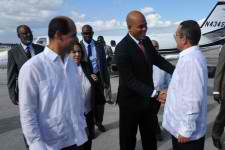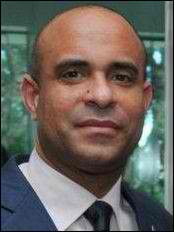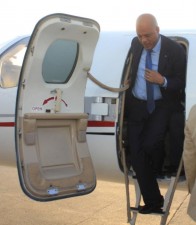
President Martelly arrival in Cuba
President Michel Martelly took his first official trip to Cuba on Tuesday Nov. 15, 2011, a diplomatic mission he hoped would strengthen bilateral relations and traditional cooperation between Haiti and Cuba while identifying new avenues of cooperation.
“That does not make sense,” said Martelly, talking about U.S.’s embargo against Cuba. “Haiti pleaded the cause of the Cuban people by voting for the lifting of the blockade,” he added. The president’s statements reinforced a senate resolution adopted a week earlier, condemning U.S.’s economic, commercial and financial embargo against the neighboring nation.
Since resuming diplomatic relations in 1995, both countries engaged in intergovernmental cooperation, placing Cuba among Haiti’s strongest and most loyal allies in the region. From literacy programs to agricultural initiatives, the Cuban government’s assistance to Haiti increased gradually, particularly in the health sector with hundreds of Cuban health specialists deployed throughout the country and hundreds more Haitians being trained in Cuba. After the devastating Jan. 12 earthquake, Cuban medical personnel providing free healthcare to Haitians increased from 350 to nearly 700, working alongside more than 400 Haitian graduates of Havana’s Latin American School of Medicine. The two countries suspended diplomatic relations during the Duvalier dictatorship (1957-1986).
Ambassador of Haiti to Cuba, Jean Geneus and Rogelo Sierra, Cuban Deputy Minister of Foreign Affairs welcomed President Martelly and his 29-member delegation at the airport. Martelly called his meeting with Cuban President Raul Castro and former leader Fidel Castro historic and unforgettable where he renewed Haiti’s commitment to continuing cooperation with Cuba.

Foreign Affair Minister Laurent Lamothe
For his part, Foreign Affair Minister Laurent Lamothe, among several Ministers that accompanied President Martelly, reported Haiti also securing a $5 million housing project from Indian Ambassador to Cuba Shri Deepak Bhojwani who is also accredited in Haiti. The donation will fund Village Gandhi, a 500-house community that will provide permanent housing for hundreds of Haitian families still living in flimsy makeshift camps throughout Port-au-Prince and surrounding communities.
President Martelly expressed great satisfaction with his trip shortly after his plane landed a Toussaint Louverture Airport in the Haitian capital, although it is unclear how Washington perceived such initiative given its prevailing isolationist policies toward Cuba. “They were very good opportunities for further developing relations between our two countries on the basis of solidarity,” he told the Digital Granma International, official daily newspaper of the Cuban Communist Party’s Central Committee. “The work of Cuban health professionals in our country, the training of more than 700 young Haitians as doctors and what has been done in other areas of cooperation are very important, because they are contributing to the future of Haiti,” he explained to Eduardo Palomares Calderon, reporting for the news organization’s English edition.

President Michel Martelly exits plane
Before the trip, both the president and vice president of the General Assembly declined invitations to join President Martelly, stirring up debates surrounding ongoing conflicts between the executive and legislative branches. “Responding to such an invitation would tarnish the image of the Haitian Parliament,” declared Sorel Jacinthe, president of the House of Deputies. Senate President Jean Rodolphe Joazile also perceived his role in the ongoing senate investigation into Belizaire’s arrest a priority over Martelly’s trip, although he thanked the president for extending the invitation to him.
A political storm blanketed the country when, on October 27, 2011, UN troops and other specialized units assisted the Haitian National Police in arresting and detaining sitting Deputy Belizaire, returning from a diplomatic mission in France. President Martelly denied any involvement in the matter, as both the government and the senate launched parallel investigations to find the hierarchical roots of the flagrant constitutional violations and take appropriate measures against the authors.
Addressing the national crisis before leaving for Cuba, Martelly saw dialogue between the three branches of government as the only sure way to an eventual resolution. Lawmakers meanwhile found their own antidote: “Normalizing relations between the legislative and the executive begins with the firing of all those implicated in the arrest of Deputy Arnel Belizaire,” articulated Jacinthe.